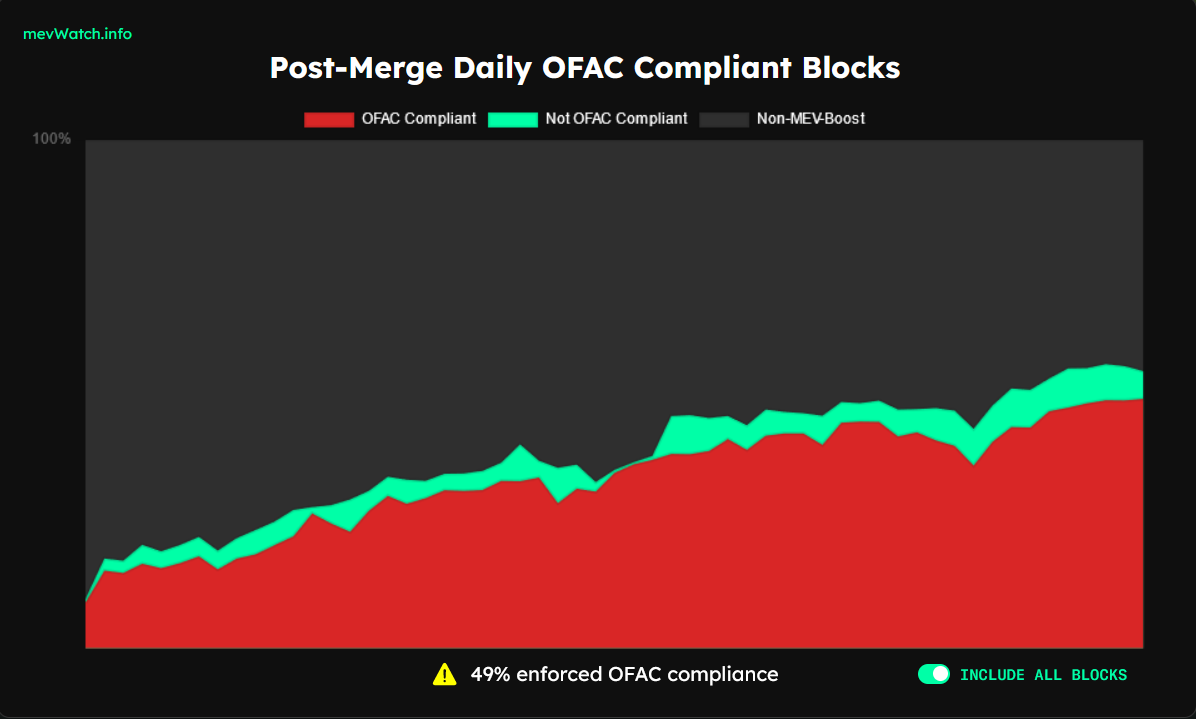Ethereum (ETH)’s move to proof-of-stake had raised fears of greater network censorship. And these fears seem partially justified, since new data shows that half of the blocks produced are subject to requests from the American regulator OFAC, which is part of the United States Treasury. What does that mean ?
Reminder: Ethereum, proof of stake and validators
Ethereum now works with proof of stake. That is to say that it is validators – and no longer miners – who check the conformity of transactions and who integrate them into successive blocks. The latter have an economic incentive to provide this work, and of course seek to maximize their profits.
This is where the “MEV-boost” come in. To put it simply, MEV-boosts allow customers to outsource building blocks. This means that they sell their block space to external entities. who build them to optimize space – and therefore the yield for the validators.
The problem with these MEV-boots, is that they can choose to be regulated by the regulator Office of Foreign Assets Control (OFAC). The latter is part of the United States Treasury, and in particular manages the sanctions applied by the nation to various entities. We recently heard about him in the Tornado Cash case: OFAC had sanctioned the cryptocurrency mixer, already triggering controversy.
If these SPD-boosts choose to be regulated by OFAC, this can of course pose a problem of censorship. The State could indeed prevent transactions from being validated, or prioritize certain ones. This goes against the philosophy developed by Ethereum, and cryptocurrencies in general.
? Related – Bittrex Exchange to Pay $53 Million for Dodging US Sanctions
The DeFi protocol that optimizes your interests
Put your cryptocurrencies to work ?
50% of Ethereum transactions submitted to US Treasury?
And this is precisely what seems to be happening for the majority of Ethereum blocks. According to data published by MEV Watch, yesterday, more than 50% of the blocks were built by MEV-boosts that comply with OFAC requirements:

Share of Ethereum blocks that comply with OFAC requirements
Among the blocks built by MEV-boost, 89% are subject to the requirements of this US Treasury Department. Moreover, the number of blocks produced in this way tends to increase since the Merge, if we observe the following graph:

Progression of Blocks Submitted to OFAC Since Ethereum Switched to Proof of Stake
Let’s take an example of the limitations of MEV-boosts that choose to submit to the Treasury. They will not be able to include transactions from the Tornado Cash protocol, which is on OFAC’s sanctions list. The transactions in question can of course be processed by other validators, but if they do not necessarily have great visibility on the network.
? To go further – How does proof of stake work?
Join Experts and a Premium Community
PRO
Invest in your crypto knowledge for the next bullrun

Ethereum is more censorable than in the past?
What to remember from all that ? First of all that Ethereum is now more censorable than in the past, if validators choose to use MEV-boosts. But also that any protocol, even decentralized, is subject to the geographical location and the choices of its main actors.
The problem is of course not unique to Ethereum, even if the use of MEV-boost accentuates the imbalance. We remember that the Bitcoin (BTC) mining firm Marathon Holdings had sparked a scandal on this subject in March 2021. It had indeed chosen to mine blocks complying with US regulationsincluding those of OFAC.
This is a point of vigilance that was debated even before the Merge, and it would seem that the fears were justified. What will happen if this share of transactions continues to grow? The coming months we will tell, but it is a significant problem, which will have to be monitored.
? Also in the news – Offchain Labs Acquires Leading Ethereum (ETH) Development Team
The exchange that has the wind in its sails⭐
5% off your fees with this button

Source: ETHResearch, MEVwatch
Newsletter ?
Receive a summary of crypto news every Monday by email ?
What you need to know about affiliate links. This page presents assets, products or services relating to investments. Some links in this article are affiliated. This means that if you buy a product or register on a site from this article, our partner pays us a commission. This allows us to continue to offer you original and useful content. There is no impact on you and you can even get a bonus by using our links.
Investments in cryptocurrencies are risky. Cryptoast is not responsible for the quality of the products or services presented on this page and could not be held responsible, directly or indirectly, for any damage or loss caused following the use of a good or service highlighted in this article. Investments related to crypto-assets are risky by nature, readers should do their own research before taking any action and only invest within the limits of their financial capabilities. This article does not constitute investment advice.

